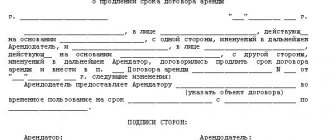How do the concepts differ?
The date of signing the contract is a clearly defined concept. It is understood as the date when the signatures were placed at the bottom of the papers, which are directly the originals of this contact. This date appears next to these signatures. This ensures that this detail was physically placed on the documents on that very day.
At the same time, the date of conclusion of the contract is a much less unambiguous concept. It is not precisely defined in the legislation and may or may not coincide with the date of the actual signing of the paper.
In other cases, such a date may be taken as follows:
- another number specified in the agreement itself;
- the day on which this paper was drawn up is placed at the top of the document on the right;
- the date when other documents were signed, for example, a receipt or an acceptance certificate, if this agreement is of a real nature, in particular if we are talking about the loan of certain things.
However, in practice, the courts take the day when the contract was concluded to be the date on which it was signed. Any other day from the list above can be considered as the date of conclusion only if evidence is presented that it should be considered in this way, including the date of the agreement.
In the absence of such evidence, both dates (signing and conclusion) coincide.
This also applies to the situation when the date of drawing up is given at the beginning of the agreement, if at the end there is a date next to the signature, and they differ, then it is believed that the conclusion of the transaction occurred precisely on the day indicated at the end, and not at the beginning document.
On the other hand, a situation cannot be ruled out when the contract contains only the date of its preparation, while the date of signing is missing.
It is assumed that the date of preparation is the day on which the document was drawn up on paper, after which it can be signed on the same date or left for consideration by one of the parties or both counterparties for an indefinite period.
Finally, it should be remembered that the dates of the agreement, as well as its signing and conclusion, are not mandatory details of this document. If it stipulates dates (or periods) for the execution of actions that both parties commit to each other, then this is quite enough for the transaction.
The day on which this transaction was formalized on paper need not be cited at all. In the future, the parties simply need to fulfill their obligations in due time.
When does the contract come into force?
Civil law directly establishes that a contract comes into force from the moment it was concluded. Although this rule itself is quite precise, one should remember what was indicated in the previous section, namely, that the date of conclusion of the agreement itself is not established in the same precise manner in regulatory legal acts.
Due to this circumstance, in order to determine from what moment the agreement comes into force, it is necessary to establish the date of its conclusion, which may either (more often) coincide with the date of its signing, or (less often) differ from it.
Special situation with some real estate transactions. These transactions are subject to state registration. As a result, the effective date for agreements of this kind becomes the date on which they were officially registered.
This applies to contracts of purchase and sale of any object, annuity with lifelong maintenance, exchange, donation.
The same rule applies to renting a home for at least a year. In addition, registration is required in case of registration of a mortgage (transaction with real estate pledged). Finally, a similar requirement is provided for when an enterprise as a property complex changes hands.
At the same time, the legislation does not indicate the need to register such real estate transactions as the purchase and sale of objects with non-residential purposes or their exchange.
There is also no need for this action when renting housing for up to a year.
As a result, there is a practice of concluding housing rental transactions for 11 months, since state registration is not required for such contracts. Likewise, there is no need to register preliminary agreements relating to real estate.
Effective date
The employment contract comes into force on the date:
- when the employee is given access to work. Moreover, permission to work must be carried out on behalf of the employer (if not by himself, then by his representative) or with his knowledge;
- signing it by both parties;
- specified in the federal law or other regulatory legal act;
- indicated in its text.
The entry into force of the employment contract for both parties means that from that moment the parties assume the agreed upon obligations and bear responsibility for their failure to fulfill them.
What to do if the dates don't match
A situation where the date of drawing up the contract and the date of its signing do not coincide is quite possible. Such cases arise if, for example, the parties are geographically located far from each other, and after drawing up the agreement they needed time to formalize it.
Another situation is if, after the document was drawn up, both parties needed significant time to review it, following which they put their own signatures on it.
Finally, a situation is possible where the offeror proposed a certain agreement, the acceptor considered it for a certain period, at the end of which he came to the conclusion that he agreed with its terms, but he prefers that the transaction not be considered valid from the moment the paper is drawn up.
In this case, often the date of the contract is indicated at the top of the document, and the date of signing is at the very bottom.
If the date of drawing up the agreement and its signing do not coincide, then a special provision can be provided in the document itself. This paragraph will state the date on which it becomes effective.
In this case, it is also possible not to indicate a separate additional date, but to provide that the date of conclusion of the agreement is either the date written at the top (in general, this is the date of the physical preparation of the paper) or the date at the bottom (that is, the signing of the paper).
Another solution is also possible, namely, to enter into the document only the date of preparation (in its upper right corner), and not to mention the day on which the signatures were placed. In this case, it is this day indicated at the beginning of the document that is considered as the date of conclusion of the document.
Terminology of the Civil Code of the Russian Federation in relation to transactions and agreements
According to the provisions of the Civil Code of the Russian Federation, the terms agreement and transaction can be described as follows:
- A transaction is an interaction between individuals and organizations for the purpose of arising, changing or completing certain civil rights and obligations, in accordance with Art. 153 Civil Code of the Russian Federation. In this case, transactions can be bilateral or multilateral in accordance with Art. 154 Civil Code of the Russian Federation.
- A contract is an agreement between several parties on the emergence, change or termination of certain civil rights and obligations, according to Art. 420 Civil Code of the Russian Federation. Agreements, like transactions, can be either bilateral or multilateral.
As can be seen from these two definitions, the term agreement will be part of the transaction, that is, the transaction is general, and the contract is private. The Civil Code itself establishes the regulatory framework for transactions and contracts in different chapters, which further indicates the non-identity of these terms. The term transaction as an institution is described in the main part of the Civil Code of the Russian Federation, and the variety of types of contracts as a sub-institution is regulated by the second part of the Civil Code of the Russian Federation.
If we try to outline the differences in one phrase, then any agreement implies a transaction, but not every transaction includes an agreement.
What is an open date contract?
An open-ended agreement is a document that does not indicate the exact date of its conclusion. In practice, such agreements are common between employers and employees. However, such documents have no force under Russian law. In particular, when an agreement of this type is concluded between a company and an employee, it worsens the latter's position compared to a regular agreement.
Since the employer can put a number in this document at his discretion, he can ultimately reduce the employee’s length of service, which will be unprofitable for the latter.
At the same time, the subordinate, for his part, having already been allowed to work, leaves a certain documentary trace. He is given a pass, and his signatures are also on the papers. Based on such facts, he subsequently has the opportunity to demonstrate that he actually worked for this organization from such and such a date.
In this case, his contract with her is considered concluded; starting from this moment, the employer will have to draw up a regular employment contract with the corresponding date indicated in it.
For more information about the date of conclusion and signing of the contract, see the video below.
The difference between the date of preparation and the date of signing the contract
Despite the fact that the absence of such details as a date does not entail the invalidity of the contract (resolution of the Federal Antimonopoly Service of the East Siberian District dated May 17, 2007 in case No. A78-2708/06-S1-7/122), often the date of signing is important for determining the moment the beginning of the contract (if the law or contract stipulates that contractual relations begin from the moment the agreement is concluded/signed by the parties or within a certain period after signing).
An agreement is a document; accordingly, the rules of business turnover and the recommended GOST R 7.0.97-2016 require the presence of such details as a date.
But often in the text of the contract there are different dates:
- direct production of the document - at the beginning;
- the actual signing of the document - at the end.
The reason for the appearance of the second date may be the territorial remoteness of the parties or the long period of consideration of the document sent by the counterparty (usually the date of signing is added by the acceptor, who is not ready to consider the agreement valid from the moment of its preparation). Accordingly, a dilemma may arise as to which of these dates to focus on as the date of conclusion of the agreement .
Differences between a contract and a transaction
They are as follows:
- a transaction is a general phenomenon of which the contract is a part;
- a transaction, unlike a contract, can be one-sided (for example, a will or abandonment of property);
- Any action can be subsumed under a deal, but a contract is always the result of coordinated actions of two parties;
- a contract is valid for a certain period of time or without a term, a transaction is a one-time manifestation of the will of the subject of the relationship;
- the subject is free to enter into a unilateral transaction, change its terms, and the contract is changed by mutual agreement (rare exceptions are specified in the law).
The listed differences between a transaction and a contract are sufficient, but they do not end there.
Detailed information about a fixed-term employment contract
In this situation, the contract cannot be terminated only if the organization ceases to exist.
Otherwise, in a labor dispute, this fact will be qualified as a violation of the employee’s rights. In addition, it is impossible to conclude fixed-term employment contracts multiple times without a temporary break, if we are talking about employees performing the same job function. If we talk about the positive side, then it must be said that in this case the employer can completely control the actions of the employee. The Labor Code sets out the basic requirements and rules. The document specifies the unconditional grounds and conclusion of the document in connection with the agreement of both parties.
Let's consider a fixed-term employment contract and its conditions: fixation of the contract due to another employee leaving the place of work for some time; establishment of temporary or seasonal work; work abroad; due to an increase in volumes at the enterprise; if the company will operate only for a specific time; during the internship period of the future employee; at the time of attachment to the vacancy in question; with inconsistent funding of the elected body; when working at the labor exchange and at the ACS.
A fixed-term employment contract is concluded: the main nuances of the document
Usually, they specify the exact period when it can be terminated. In the event that it is not possible to enter dates, then the fact of the occurrence of a particular event is indicated (for example, the removal of an employee from maternity leave, the withdrawal of an employee from long-term sick leave, etc.).
As for the minimum duration of the contract, this is not provided for by law. It can be concluded for one day, one week, a month, a year, etc. True, if the minimum period is not specified, then everything is clear with the maximum.
A fixed-term contract cannot be concluded for a period of more than five years. True, sometimes the Labor Inspectorate may wonder why the company needed to enter into an employment contract for one day. In this case, it is better to have an exact justification, since it is easier to use a civil law agreement, which is also common in many organizations.
You must sign an agreement with them for a period not exceeding three years (Art.
338 Labor Code of the Russian Federation). At the end of three years, the employment contract will have to be renewed for a new term. Labor legislation obliges the signing of fixed-term employment contracts when carrying out work outside the scope of the employer’s normal activities. For example, reconstruction, installation, commissioning and other work. Need to know A fixed-term employment contract can be concluded in two cases: by agreement of the parties and depending on the nature of the work performed. Employees performing temporary (up to one year) work must also conclude a fixed-term employment contract.
In particular, if this is work related to the expansion of production or the volume of services provided. A fixed-term employment contract is also concluded with persons entering work in organizations created for a known period (or when this period cannot be precisely determined), as well as for performing a predetermined task.
Grounds for signing a fixed-term employment contract - when it is concluded, duration and obligations of the parties
The disadvantages of this type of agreement include:
- short time to master the position;
- termination of the employment relationship after the agreed period.
However, a fixed-term contract also has undeniable advantages that make it possible to consider it as an adequate alternative to regular work.
Among them are the complete preservation of all social guarantees from the employer:
- official salary;
- compensation upon dismissal.
- payment for vacation, sick leave;
A sample fixed-term employment contract for temporary work requires the presence of 2 clauses “from” and “to”, filled in with specific dates. In the last paragraph of the form, you must indicate the exact date of dismissal or a specific event associated with it.
The urgency of the contract must be indicated in the “nature of work” cell.
Which concept is broader - transaction or agreement?
Taking into account the above theses, we can say that the concept of a transaction is much broader than the concept of a contract, although in everyday speech these terms are often used as synonyms.
The primacy of the concept of a transaction is also indicated by the use of reference norms in the Civil Code of the Russian Federation: the rules relating to contracts are usually based on the norms governing transactions (for example, paragraph 2 of Article 420 - on the application to contracts of the same rules as for transactions, paragraph 1 Article 431.1 of the Civil Code of the Russian Federation - on the invalidity of contracts, etc.).
In addition, the legislator uses language that makes it possible to define an agreement as a type of transaction. For example, clause 3 of Art. 431.1 of the Civil Code of the Russian Federation: “In case of recognition as invalid at the request of one of the parties to an agreement that is a voidable transaction...”.
The general conclusion can be formulated as follows: every contract is a transaction, but not every transaction is a contract. This conclusion is based not only on a systematic analysis of the above rules, but also on the direct designation by law of an agreement as a type of transaction that has at least 2 parties.
For what period is a fixed-term employment contract concluded in 2020?
A fixed-term employment contract can be concluded without fail for certain types of work, as well as by agreement of the parties.
In turn, the contract can be terminated early according to the following conditions: mutual agreement of the parties (Article 78), the general norms of an open-ended contract are observed; employee statement (Art.
In particular, the employee and the employer may mutually decide to enter into a fixed-term contract if:
| Describe the structure, features, parties to the agreement, as well as their roles in labor relations | |
| Considers possible terms for concluding an employment contract and their classification according to the criterion of the conclusion period | |
| —, | They establish exactly how the employment contract begins and ends, and also determines the documentary side of formalizing the employment relationship. |
| Staff of the employer-entrepreneur (IE) | Does not exceed 35 people (20 people in trade) |
| A pensioner is hired | Who is allowed to work exclusively on a temporary basis due to health conditions |
| A person is employed by a company | Operating in the Far North |
| The employee is involved in activities | Related to eliminating the consequences of emergencies and other disasters |
| There is a competitive selection | For a specific position |
| The activity of a person is creative | And it involves the creation of any work (on an individual or collective basis) within a certain period) |
| When hiring a part-time employee | As well as an applicant for the position of manager or chief accountant |
| In case of registration of labor relations with ship crew members | And also when attracting full-time students to work |
It should be emphasized that special clauses for concluding a fixed-term employment contract may be contained in regional regulations that apply exclusively within a specific territory.
Fixed-term contract and pregnant employee
The situation when an employee hired on a fixed-term contract turns out to be pregnant is quite common. How should an employer act so as not to infringe on the interests of the employee and avoid unnecessary costs and litigation? Let's look at typical situations.
- After concluding a fixed-term contract, the woman announced her pregnancy. It is impossible to dismiss such an employee if she applied for an extension of the contract after the expiration of the contract; the contract will have to be extended until the end of the pregnancy (Part 1.2 of Article 262 of the Labor Code of the Russian Federation), or until the end date of maternity leave, if it was provided. This can be done if the contract was concluded for a clearly defined period. But if the employee was hired during the absence of the main employee, and such employee began duties, the dismissal of a pregnant woman, if there is no other suitable job for her, taking into account her health, is permissible.
- After dismissal due to the end of the contract, the employee provided a certificate of pregnancy at the time of dismissal. From the point of view of the law, the dismissal was carried out correctly, but as judicial practice shows, such an employee can count on reinstatement at work and an extension of the employment relationship until the end of pregnancy (Part 1.2 of Article 262 of the Labor Code of the Russian Federation). The fact that the employer was not informed about the fact of pregnancy does not prevent the court from satisfying the claim for reinstatement at work.
As you know, it is possible to fire a pregnant woman at the initiative of the employer only in the event of liquidation of the organization (Article 261 of the Labor Code of the Russian Federation). But this is not the only legal way to fire pregnant women. Important: dismissal upon expiration of the contract is not termination of the contract at the initiative of the employer, therefore it is allowed for pregnant women and employees with children under 3 years of age. Temporary employment relationships can also be terminated at the initiative of the employee, or on other general grounds.








